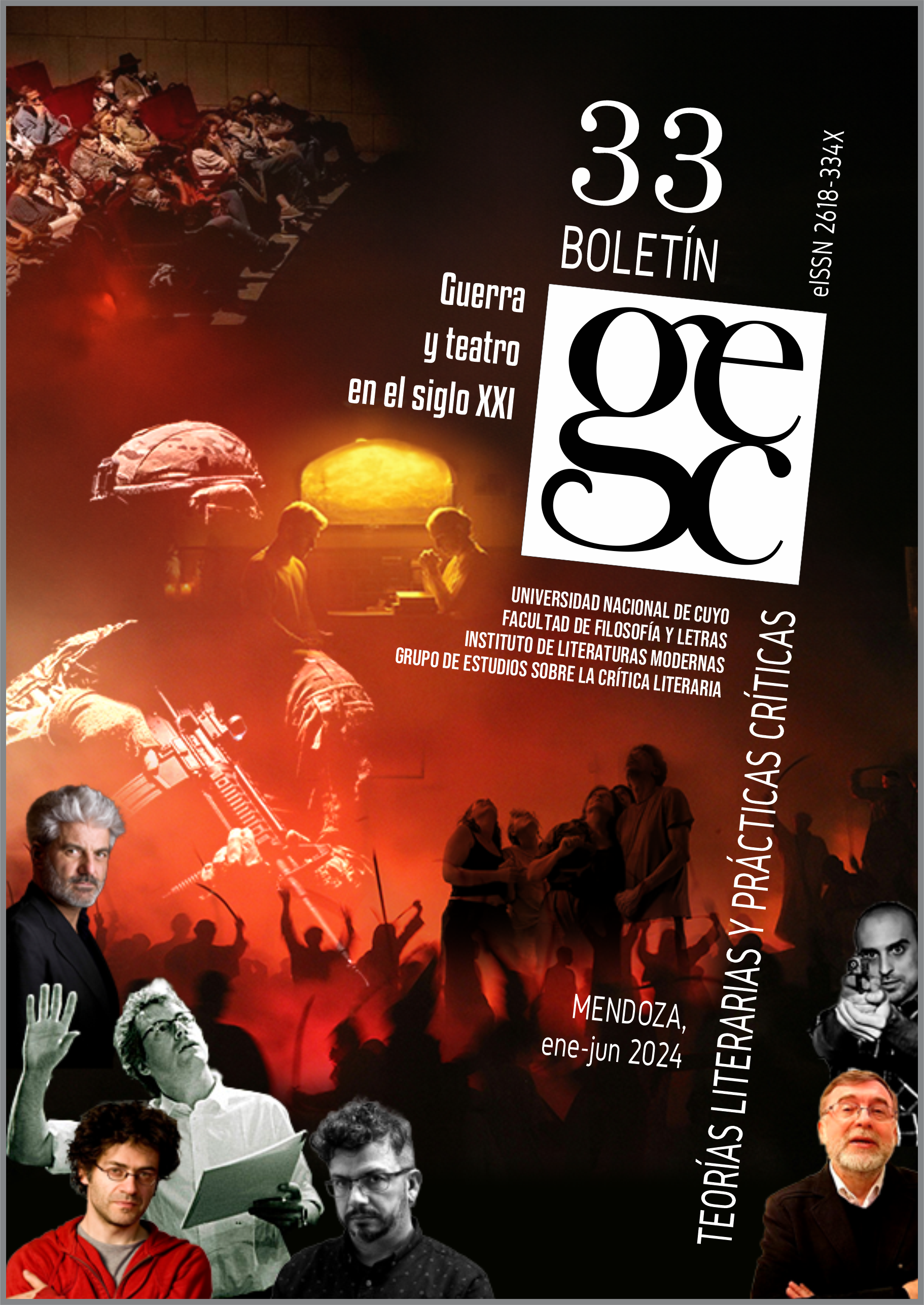Emotions of war, but in the theatre: A case of theatrical expectation
DOI:
https://doi.org/10.48162/rev.43.061Keywords:
theatrical expectation, empirical cognitive poetics, emotions, emotions of war, empathy and distanceAbstract
According to some thinkers, “new wars” do not fit well with the typical idea of warfare in the modern era: a declared confrontation between states. Critical discourse is even suspicious of the word “war”. Sometimes it looks for other names, such as “persecution” or “massacre”, and the same goes for old wars similar to the new ones. The play studied in this paper is precisely a critical review of the past, a farce of historical materials that dismantles the official account of the so-called “Conquest of the Desert” (1878-1885), an incursion by the Argentine army into territories inhabited by indigenous populations: Los establos de Su Majestad, revived in 2023 by Víctor Arrojo in Mendoza, Argentina. In addition to the play, the article analyses the reception of a group of spectators, using a cognitive approach and an empirical method. To do so, a sample was previously collected through a combination of techniques: discussion groups and a questionnaire. The qualitative analysis focuses on emotional reactions and the cognitive elaboration of emotions. By comparing the critical review proposed by the play with the response of a group of spectators, questions and hypotheses about the effectiveness of this type of critical discourse will be raised.
References
Azzellini, D. (comp.) (2009). El negocio de la guerra: Nuevos mercenarios y terrorismo de Estado. Monte Ávila.
Bajtín, M. (1989). Teoría y estética de la novela: Trabajos de investigación. (Trad. H. S. Kriúkova y V. Cazcarra). Taurus.
Bajtín, M. (2012). Problemas de la poética de Dostoievski. (Trad. T. Bubnova. Introducción , bibliografía, cronología y revisión de T. Bubnova y J. Alcázar, 3.ª ed.). Fondo de Cultura Económica.
Bartolomé, M. A. (2004). Los pobladores del “desierto”. Genocidio, etnocidio y etnogénesis en la Argentina. Amérique Latine. Histoire & Mémoire. Les Cahiers ALHIM, (10). https://doi.org/10.4000/alhim.103
Bayer, Osvaldo (coord.) (2010). La crueldad argentina: Julio A. Roca y el genocidio de los pueblos originarios. RIGPI.
Briones, C. y Delrio, W. (2007, 01 de julio). La “Conquista del Desierto” desde perspectivas hegemónicas y subalternas. RUNA. Archivo Para Las Ciencias Del Hombre, 27(1), 23-48. http://revistascientificas.filo.uba.ar/index.php/runa/article/view/2639
Cagni, H. (2009). Reflexiones en torno a los conceptos de guerra justa y cruzada y su actual revalorización. Revista Enfoques, 7(10), 157-181. http://www.revistaenfoques.cl/index.php/revista-uno/article/view/188
Drucaroff, E. (2015). Otro logos: Signos, discursos, política. Edhasa.
Goldstein, T. R. y Hayes, K. (2021). Embodiment and containment: Flexible pathways to flourishing in theatre. En L. Tay y J. O. Pawelsky (Eds.), The Oxford handbook of the positive humanities (pp. 362-376). Oxford University Press.
Keegan, J. (2014). Historia de la guerra. (Trad. F. M. Arribas). Turner Publicaciones. (Original publicado en 1993).
Kneepkens, L. y Zwaan, R. A. (1994). Emotions and literary text comprehension. Poetics, 23, 125-138.
Koopman, E. M. y Hakemulder, F. (2015). Effects of literature on empathy and self-reflection: A theoretical-empirical framework. Journal of Literary Theory, 9(1), 79-111. https://doi.org/10.1515/jlt-2015-0005
Lorenzo, F. y Rodríguez, A. (texto original), De Monte, S. (versión) y Arrojo, V. (adaptación) (2023). Los establos de Su majestad. [Obra dramática en archivo de Word]. Copia en posesión del autor, facilitada por V. Arrojo.
Los establos de Su Majestad (2023). [Programa de mano digital]. Teatro Nacional Cervantes. (Incluye ficha técnica del espectáculo con mención de los creadores y creadoras responsables). https://www.teatrocervantes.gob.ar/obra/los-establos-de-su-majestad/
Luttwak, E. N. (1995). Toward post-heroic warfare. Foreign Affairs, 74(3), 109-122. https://doi.org/10.2307/20047127
Mar, R. M., Oatley, K., Djikic, M. y Mullin, J. (2011). Emotion and narrative fiction: Interactive influences before, during, and after reading. Cognition & Emotion, 25(5), 818-833. http://dx.doi.org/10.1080/02699931.2010.515151
Miall, D. S. y Kuiken, D. (2001). Shifting perspectives: Reader’s feelings and literary response (pp. 289-301). En W. van Peer y S. Chatman (Eds.), New Perspectives on Narrative Perspective. Suny Press.
Münkler, H. (2005). Viejas y nuevas guerras: Asimetría y privatización de la violencia. Siglo XXI.
Nussbaum, M. C. (2001). The fragility of goodness: Luck and ethics in Greek tragedy and philosophy. Cambridge University Press.
Oatley, K. (1992). Best laid schemes: The psychology of emotions. Cambridge University Press.
Oatley, K. (2011). Such stuff as dreams: The psychology of fiction. Wiley / Blackwell.
Pérez, P. (2019, 1 de noviembre). La Conquista del desierto y los estudios sobre genocidio. Recorridos, preguntas y debates. Memoria Americana. Cuadernos de Etnohistoria, 27(2), 34-51. http://revistascientificas.filo.uba.ar/index.php/MA/article/view/7160
Sauter, W. (2002). Who reacts when, how and upon what: From audience surveys to the theatrical event. Contemporary Theatre Review, 12(3), 115-129.
Segato, R. L. (2016). La guerra contra las mujeres. Traficantes de Sueños.
Downloads
Published
How to Cite
Issue
Section
License
Copyright (c) 2024 Luis Emilio Abraham

This work is licensed under a Creative Commons Attribution-NonCommercial-NoDerivatives 4.0 International License.
Aquellos autores/as que tengan publicaciones en esta revista, aceptan los términos siguientes:
- Los autores/as conservarán sus derechos de autor y garantizarán a la revista el derecho de primera publicación de su obra, el cual estará simultáneamente sujeto a la Licencia de reconocimiento de Creative Commons que permite a terceros compartir la obra siempre que no se use para fines comerciales, siempre que se indique su autor y su primera publicación en esta revista, y siempre que se mencionen la existencia y las especificaciones de esta licencia de uso.
- Los autores/as podrán adoptar otros acuerdos de licencia no exclusiva de distribución de la versión de la obra publicada (p. ej.: depositarla en un archivo telemático institucional o publicarla en un volumen monográfico) siempre que se indique la publicación inicial en esta revista y se cumplan las otras condiciones mencionadas arriba.
- Se permite y recomienda a los autores/as difundir su obra a través de Internet (p. ej.: en archivos telemáticos institucionales o en su página web) antes y durante el proceso de envío, lo cual puede producir intercambios interesantes y aumentar las citas de la obra publicada. (Véase El efecto del acceso abierto).














